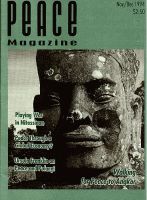
Peace Magazine Nov-Dec 1994, page 10. Some rights reserved.
Search for other articles by Theodore Herman here
The constant discussion of what action the United Nations should take to halt the fighting in the former Yugoslavia has left the world with no solution. The alternative for peace is psychological and political persuasion, using every form of media known.
The U.N. must be authorized to cover the entire area of the former Yugoslavia by radio, TV, and printed matter distributed on the ground and dropped from the air. Using trained staff, the U.N. must address both soldiers and civilians. The opportunity to stir up anti-war sentiment among both civilians and soldiers will be obvious to anyone.
The first task of such a U.N. effort is to build a steady audience by giving out accurate daily news and helpful information for those in distress.
Second, messages can urge those who want to end the war to undertake such actions as:
a) refusing, where possible, to vote for or obey criminal leaders, whether civilian or military;
b) urging families to persuade their loved ones in the armed forces to obstruct, go slow, come home, refuse to commit atrocities, and reach out to help some of the victims around them, regardless of their ethnicity;
c) encouraging young men coming of age to avoid the draft, since this is not a war against a foreign invader;
d) organizing and speaking out against the war, especially to young people, the clergy, and teachers;
e) urging the arrest of criminals who were released from prison for army service, many of whom are now committing crimes in the cities. Also urge arrest of those in command who order their forces to commit atrocities or do not try to prevent them;
f) Those who fear standing up against the fighting can be reminded of nonviolent resistance movements that have overturned oppressive governments in Europe over the past 150 years, as in Hungary under Francis Deak (1849-1867), and Czechoslovakia in 1989.
Third, they must be persuaded to report mistreatment to nearby U.N. personnel and to relief workers so the U.N. can publicize such information daily, in order to uncover the "evildoers," especially in their home districts. The idea is to use public shame as a restraint on future crimes, and to prevent the shielding of war criminals.
Fourth, the U.N. can declare places like Sarajevo security zones for civilians and soldiers who wish to resist the war. Such zones must be protected by U.N. armed units ready to return fire if attackedby anyone.
Fifth, those who turn themselves in or are handed over as war criminals for a cash bounty must be protected from reprisal, examined for their misdeeds, and, if found liable, held for future trial by a court or trained people's tribunal in their home districts.
Sixth, having people serve on war crimes tribunals for their neighbors makes them responsible for deciding the kind of treatment that will lead to local and hence national peace. Sentences could range from execution, imprisonment, and exile to restitution, public service, therapy, acquittal, and so on. For every case there should be a combination of justice for the victims and concern for a more peaceful community to be built. To stand for non-violence and reconciliation does not mean to overlook evil.
Seventh, it is essential to enlist the millions of former Yugoslavs living abroad as a powerful force for peace. They could conduct relief drives for victims on all sides, not just their own.
Eighth, worldwide publicity should be given to those who are doing heroic relief work in the war-torn areas and abroad. Little is known about their devoted service, nor of moves to set up conflict resolution programs in Balkan schools and universities.
All these messages and activities by the U.N. aim to split supporters from tyrannical rulers, release the guilty or those who just "go along" from some of the physical and spiritual ties to evil, and offer the possibility for reconciliation.
(Excerpted from a paper written for the International Peace Research Association, which met in Malta in October.)

Peace Magazine Nov-Dec 1994, page 10. Some rights reserved.
Search for other articles by Theodore Herman here